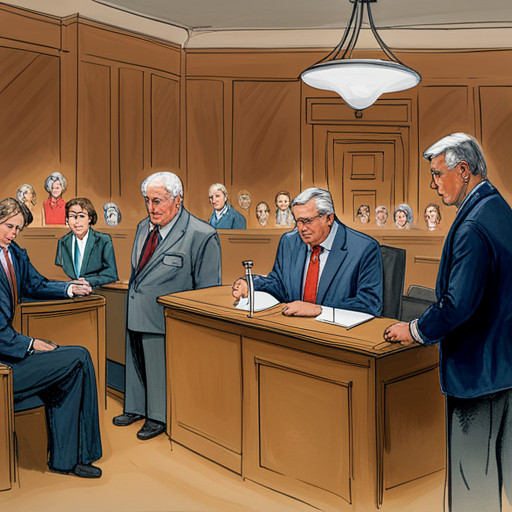Battle Over Leadership in Camp Lejeune Toxic Exposure Cases Continues with New Filing on August 28th 2023
There is a lot of money at stake in the Camp Lejeune water lawsuits, and attorneys are maneuvering to claim their stake. You would hope that the 35-40% that most are charging their clients would be enough to keep them happy, but with such a large group of attorneys and plaintiffs, you are bound to find a few greedy folks in the mix.

When I first read the Motion to reconsider filed by Wiley, I assumed that they were small guys who were opposing the old boys club of mass tort litigation. They claimed there was lack of transparency in the process to setup leadership committees, but as this drama unfold, it's feeling more to me like Wiley took a gamble and got caught with their hand in the cookie jar.
Here's what's alleged as best as I can tell.
Wiley rushed to attempt to file the first class action lawsuit when the administrative claims were exhausted with hopes to be the firm leading the class action.
Once leadership was established, Wiley asked for a committee appointment and threatened to ask the court to reconsider if they didn't get the appointment. To be fair to Wiley, at all times they claim to be acting in their clients best interests. (Personally, I fail to see how rushing to file the "first" class action, is acting in their clients best interests.) The leadership group, and quite frankly the court, likely seeing through this from day one, decided Wiley would not be the best firm to be involved in the leadership committees.
More importantly, if Wiley contends that their clients and class action is what should be the first and primary case tried, that is most likely not reflective of whats in the best interest of all the claimants. The law firms involved have been extremely deliberate in filing the most empathetic and winnable cases, because if these cases don't settle before a Jury hears a case or two, it's in everyones best interest (expect maybe the tax payers) for those cases to be the strongest cases possible. Considering Wiley only has 13 cases at the lawsuit filing stage, statistically, it's less than 0.1% of the cases, I just don't see how any of their cases would be representative of everyone else, or the most compelling to a jury.
At this stage, what I see is a waste of court and attorney resources:
Dealing with an issue that was raised and dealt with already, and a law firm that doesn't seem to care about the victims and the uneccessary delays. Complex litigation firms are some of the most advanced litigators on the planet. I fail to see how strong arming them to posturing, positioning, and raising a distraction serves the plaintiffs who already are waiting for ages to get their justice and settlements.
I am not an attorney, and perhaps some of these filings are absolutely necessary for future potential appeals, etc... but from my vantage point, I think anything that delays or spends legals resources on procedures that don't move the ball closer to a settlement matrix and tranches of cases starting to be settled is a mistake.
Below is a synopsis of the info from the filing August 28th 2023.
Make sure to subscribe for more case updates or come back often as we break Camp Lejeune lawsuit news and updates before anyone else. (Although Miller & Zois does an excellent job with their case updates.
Plaintiffs’ Leadership Group Firmly Opposes Reconsideration of Appointments Order
In a strong opposition brief filed August 28, the Plaintiffs' Leadership Group (PLG) appointed by the U.S. District Court for the Eastern District of North Carolina rejects the motion seeking reconsideration of the July 19 order establishing the leadership structure for the Camp Lejeune water contamination litigation.
The court-ordered leadership team forcefully argues that attorneys Roy T. Willey IV and Blake Abbott have not established any valid grounds for the court to reconsider its prior order, which was carefully designed to ensure efficient and fair management of claims that could eventually number in the tens of thousands.
Motion Relies on Erroneous View Court Lacked Authority for Appointments
Willey and Abbott's motion rested entirely on the mistaken assertion that the court lacked authority to institute the leadership structure because the cases have not been designated as a multidistrict litigation (MDL).
But the PLG's opposition cites longstanding precedent and guidance supporting the court's broad power under Rule 42(a) of the Federal Rules of Civil Procedure to appoint lead counsel and coordinate common pretrial issues in complex cases outside the MDL context.
The brief points to cases dating back over 60 years upholding this authority under Rule 42(a) to manage litigation efficiently when many cases involve common questions of law and fact. It also references the Manual for Complex Litigation, which advises appointing leadership in almost all complex suits regardless of MDL status.
Court Had Duty to Establish Leadership to Manage Huge Volume of Claims
Given the expected flood of claims under the new Camp Lejeune Justice Act—which allows individuals harmed by exposure to contaminated water at the base over a 30+ year period to sue—the court had a duty to institute an effective leadership structure, the PLG argues.
The brief contends there is no realistic alternative to the balanced approach ordered by the court, which preserves individual plaintiffs' rights while entrusting experienced leaders to handle issues common to all claimants in the massive litigation.
Class Certification Premature; Leadership Order Carefully Balances Interests
Willey alternatively proposed class certification and appointment of interim class counsel in lieu of the leadership structure. But the PLG maintains class certification would be premature at this early stage. The order appointing leadership protects plaintiffs' interests while promoting efficiency, the group contends.
For instance, the order directs leadership counsel to vigorously represent all plaintiffs, ensures reappointment annually, requires informing other attorneys regularly, and preserves plaintiffs' attorneys' control over individual cases.
In sum, the PLG argues Willey has not shown any clear error or manifest injustice, the only valid grounds for reconsideration. Unless the court made an obvious mistake or caused serious unfairness, which the leadership team disputes, reconsideration that would squander time and resources is unwarranted.
PLG Determined to Defend Order in Support of Efficient Resolution for Victims
The PLG's forceful opposition signals its determination to defend the court's order aimed at securing justice as quickly as possible for the many victims of water contamination at Camp Lejeune over a period of decades.
Willey has suggested he will appeal if not appointed to a leadership role, despite outreach from the PLG to discuss ways he might contribute. With large numbers of current and expected claims from aging or ill victims, the leadership structure facilitates compensation efficently while protecting individual rights.




